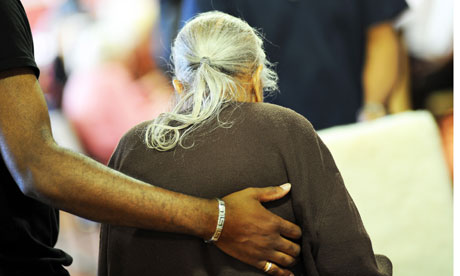
The worldwide cost of dementia this year will be £388bn in social care, unpaid care by relatives and medical bills, according to a report published today.
The organisation that commissioned it said dementia would be "the most significant health and social crisis of the 21st century".
The estimate in the World Alzheimer Report 2010 equates to more than 1% of global GDP. If dementia care were a country, it would be the world's 18th largest economy, and if it were a company, it would be the world's biggest by revenue, outstripping Walmart (£267bn) and Exxon Mobil (£200bn).
The authors of the report – academics at King's College, London, and the Karolinska Institute in Stockholm – say governments worldwide must follow the example of countries such as England, France and Australia in developing national plans to tackle the problem. Research funders must dramatically boost support to match that provided for heart disease and cancer.
The report was commissioned by Alzheimer's Disease International (ADI), an umbrella organisation of 73 associations, and follows a similar report last year that suggested there were 35.6 million people with dementia worldwide, and that this figure would increase to 65.7 million by 2030 and 115.4 million by 2050.
Costs are likely to rise even faster. Though there is a greater reliance on family care in developing countries, the numbers of those living in care homes in those countries will increase. People with dementia and their relatives will also seek the medical help provided in richer nations.
Daisy Acosta, the chairman of ADI, said the report was a wake-up call. "World governments are woefully unprepared for the social and economic disruptions this disease will cause," she said.
The report's co-author Martin Prince, at King's College's Institute of Psychiatry, said: "The care of people with dementia is not just a health issue, it is a massive social issue. This is particularly true in low- and middle-income countries which lack adequate systems of formal care. Governments must show greater leadership, working with stakeholders, to drive solutions to the long-term care issue."
Earlier this year a report for the Alzheimer's Research Trust suggested there were 820,000 people with dementia in the UK, costing the economy £23bn a year. That cost it said was nearly twice the £12bn for cancer and three times the £8bn for heart disease. Yet government and charitable research into dementia came to one twelfth of that into cancer and less than a third of that into heart disease.
Rebecca Wood, the trust's chief executive, said of today's report: "We must invest proportionately in dementia research or we risk abandoning the millions worldwide who live with the trauma or dementia today and many more tomorrow. It is not hyperbole to state that dementia is the greatest medical challenge of our times. The sooner we realise this and act, the better."
The Department of Health welcomed the report, "which emphasises the scale of the problem posed by dementia in the UK". The department would soon publish revised implementation plans for the national strategy introduced by Labour last year, which aimed to improve early diagnosis and ensure a specialist in the condition at every general hospital.
The former health secretary Andy Burnham today continued to promote the idea on funding social care, which he floated before the election when the Conservatives were promoting voluntary insurance schemes. Burnham, a Labour leadership contender, warned that public spending cuts could reduce present levels of support.
"This report confirms the urgent need to change the way we pay for the care of older and vulnerable people," he said. "As well as ensuring better diagnosis and adequate funding for research into dementia, the government must reform our broken social care system.
"Severe cuts to the care budget would see hundreds of thousands of vulnerable people paying more out of their own pocket for care or left to cope without support. It would pile pressure on families and carers who are already overstretched … The fairest answer is a national care service funded by a 10% care levy on all estates."

